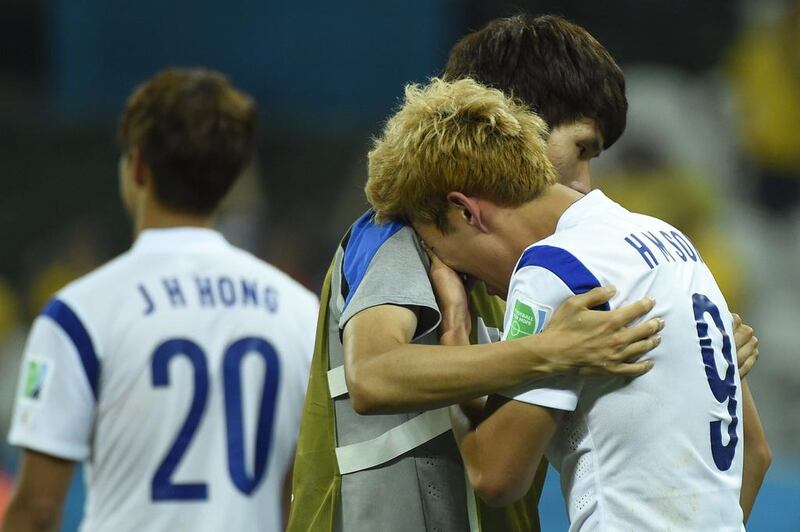When the final whistle sounded on Thursday’s match between Belgium and South Korea, Son Heung-min broke down in tears.
Inconsolable, one of Asia’s brightest young stars had faded, along with his national team, together with his continent.
[ Click here to visit The National’s World Cup 2014 landing page ]
Once the dust settles on World Cup 2014, the post-mortem will make for grim reading. South Korea’s defeat at the Arena Corinthians meant they finished bottom of Group H with a solitary point from three games.
Dead last in their pool, just like Australia, just like Japan, just like Iran. Asia’s four entrants, all eliminated at the first instance. Not one managed a victory. In 12 matches, three draws and nine defeats. Nine goals scored.
Of the 32 teams competing this month, Asia occupied spots 27 to 30 in performance terms. Only Cameroon and Honduras fared worse. This World Cup, with its national teams from five Fifa confederations, now has no representative from Asia. On the surface, Brazil has been a continental catastrophe.
Shaikh Salman bin Ibrahim Al Khalifa, president of the Asian Football Confederation, tried, as he should, to accentuate the positives. Asia’s teams were young on average, he said, “so they can only get better”.
There were bright moments, albeit few. Australia can highlight how they were dumped from one of the toughest groups and that their largely untested squad performed well above expectation.
But, alongside Cameroon, they conceded more goals than anyone else. They must learn from their two weeks here, which they undoubtedly will.
Iran, celebrated for a resoluteness against Argentina, need to look at how they could have better approached assignments against Nigeria and Bosnia. Despite the squad’s limitations, they were slow and ponderous; the match against the west Africans was arguably the tournament’s nadir.
Japan, too, underwhelmed significantly. They are better equipped to succeed at this level, with their thriving domestic league and players at top clubs overseas.
But, just like South Korea, they were overrun by stronger, physically superior opponents. Tactically, they were lacking. If Japan are supposed to be Asia’s spearhead, then where does the continent go from here? Whose model does it follow?
Carlos Queiroz, who has resigned as Iran coach, cited funding and organisational issues as major problems affecting Asian sides. Admittedly, in that role he perhaps encountered those more than most, but the point still stands.
“Asian teams year after year keep making the same mistakes, so they’ll never be able to be on the same level as Europe or South America,” Queiroz said. “It’s because of the competition system, the training and organisation.
“You cannot copy Europe because the day you think you are close, they are one step ahead because they also progress.”
Following this campaign, Asia’s progress seems stunted. It had been 24 years since the continent failed to record a World Cup victory. At four of the previous five tournaments, Asian sides advanced from the groups. In 2002, South Korea reached the semi-finals.
So this month’s struggles paint a pretty bleak picture, although the AFC said they are resolved to provide the remedy.
Following Bahrain’s resounding defeat to Uruguay in last year’s finals shoot-out, Shaikh Salman wants future Asian play-off teams to face Oceania Confederation opponents instead. But, in the short-term at least, increasing the quantity at a World Cup will not necessarily enhance the quality.
As Ange Postecoglou, the Australia coach, said: “For us as a confederation, that’s the next challenge, to try not to just come into these tournaments but really try to make an impact.”
Therefore, development, particularly at domestic level with increased investment and infrastructure, needs to be maintained, emphasised and ensured.
“Asia must acknowledge its shortcomings, but at the same time we must believe in our own ability,” Shaikh Salman said. “We must bring our game to the next level and there is no time to wait.”
World Cup 2014 has offered only further reinforcement.
jmcauley@thenational.ae
Follow our sports coverage on twitter at @SprtNationalUAE






